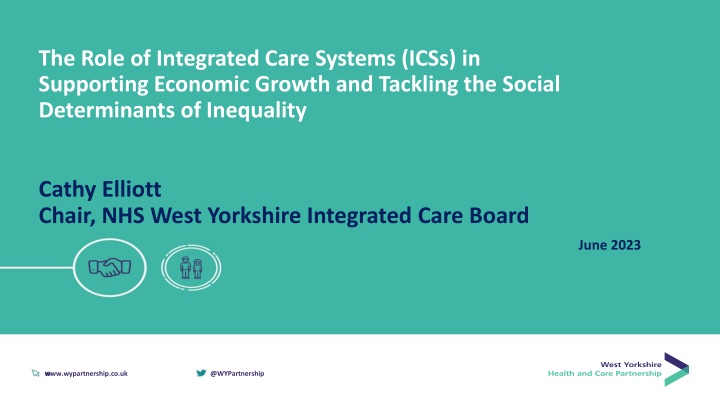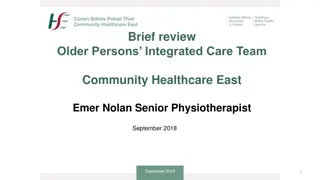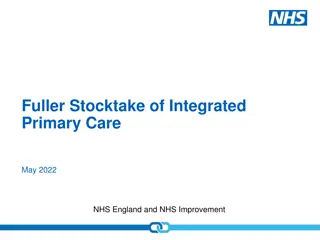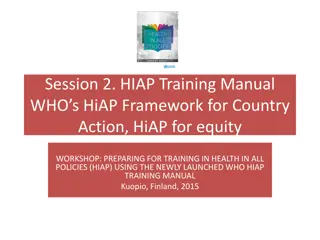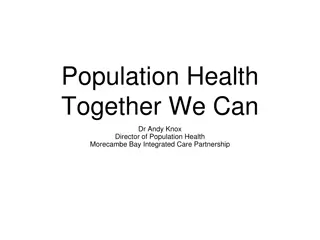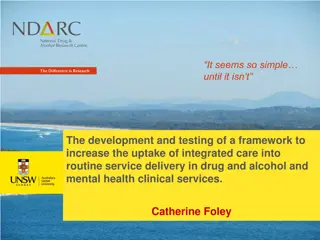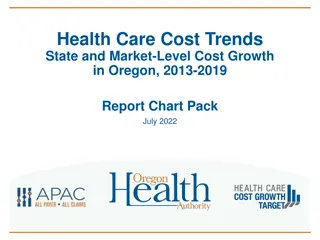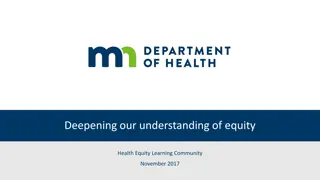Role of Integrated Care Systems (ICSs) in Promoting Health Equity and Economic Growth
Integrated Care Systems (ICSs) in the North play a crucial role in addressing social determinants of health to reduce disparities and improve outcomes. By focusing on key areas like secondary prevention, equitable service delivery, and inclusive employment practices, ICSs have the potential to create a healthier and more productive population. As they evolve, ICSs will broaden their contributions to social and economic development, working in partnership with local authorities and various sectors to tackle existing inequalities and enhance overall well-being.
Download Presentation

Please find below an Image/Link to download the presentation.
The content on the website is provided AS IS for your information and personal use only. It may not be sold, licensed, or shared on other websites without obtaining consent from the author.If you encounter any issues during the download, it is possible that the publisher has removed the file from their server.
You are allowed to download the files provided on this website for personal or commercial use, subject to the condition that they are used lawfully. All files are the property of their respective owners.
The content on the website is provided AS IS for your information and personal use only. It may not be sold, licensed, or shared on other websites without obtaining consent from the author.
E N D
Presentation Transcript
The Role of Integrated Care Systems (ICSs) in Supporting Economic Growth and Tackling the Social Determinants of Inequality Cathy Elliott Chair, NHS West Yorkshire Integrated Care Board June 2023 www.wypartnership.co.uk www.wypartnership.co.uk @WYPartnership @WYPartnership
ICSs in the North ICSs were established as partnerships of health and care organisations with a remit to address the social determinants of health and wellbeing through partnership working. ICSs in the North share several similar characteristics, including their scale, strength of local relationships, geographies with a core city and diversity of population. This scale and quality of relationships allows us to focus on the core determinants of wellbeing in a co-ordinated and focused way. This will be central to improving quality of lives and reducing pressure on services. ICSs in the North collectively spend 30 billion and directly fund 600,000 jobs, making them a key part of the Northern Powerhouse.
Disparities and need in the North of England There are significant well documented disparities between the North and the rest of England in terms health outcomes. These can be traced to wider socio- economic factors including poverty, housing, education, employment and skills. Premature deaths in the North are 20% higher than in the South, encompassing all age groups. We have seen that communities in the North have been disproportionately affected by the impact of the COVID-19 pandemic and the cost of living crisis, compounding existing inequalities, especially for ethnic minority communities. Staffing in the North reflects the health of the population, on average fewer staff available to work each day in the health and care system due to ill health (6.2% in the north versus 5.2% nationally - This translates to over 3,500 more staff each day).
Our opportunity for health and wealth creation Health and care systems across the North have a long track record of innovation, leadership and delivery, and are well placed to bring partners together to work on the social determinants of health and care, including with local government. Key areas of opportunity: Core business: ICSs have the huge potential to support a healthy, and therefore productive, population through secondary prevention and delivery of equitable, high quality, accessible services. Employers: ICSs can ensure quality local employment, inclusive recruitment practices etc Anchors: Through work as anchor institutions and convenor of networks. Relationships: Working local authorities and combined authorities and their networks of partners across sectors. Strategy: Joint strategic areas between ICBs and partners, such as inclusive economic development; climate change; EDI etc
What Next? ICSs are in development: As ICSs in the North develop and mature they will increasingly move into this space in terms of broader contributions to social and economic development. Establishment and broadening of Integrated Care Partnerships with a focus on improving the population s health, such as joint work on housing and prevention. National research and benchmarking increasingly available to guide ICSs. National Asks: Progress could be accelerated through national support in relation to: o Financial flexibilities, including capital and longer-term planning horizons. o Cross-governmental department working on health and inclusive growth. o An oversight, accountability and planning framework that places greater emphasis on outcomes and inequalities (rather than just targets). o A more integrated and longer-term approach to workforce planning. o Support for applied research and innovation, including adoption and spread.
Contacts Cathy Elliott Chair, NHS West Yorkshire Integrated Care Board cathy.elliott2@nhs.net Jennifer Connolly, Associate Director for Improving Population Health NHS West Yorkshire Integrated Care Board & West Yorkshire Combined Authority jennifer.connolly@westyorks-ca.gov.uk Useful Links Unlocking the NHS s social and economic potential: a maturity framework - https://www.nhsconfed.org/publications/unlocking-nhs-social-and-economic-potential-framework Health for wealth (NHSA) - https://www.thenhsa.co.uk/app/uploads/2018/11/NHSA-REPORT-FINAL.pdf A plan to level up the North (The Northern Powerhouse Partnership) - https://www.northernpowerhousepartnership.co.uk/a-plan-to-level-up-the- north/#:~:text=With%20the%20levelling%20up%20white,Fundamental%20change%20cannot%20happen%20ov ernight. www.wypartnership.co.uk @WYPartnership
